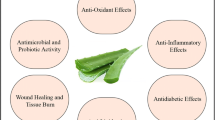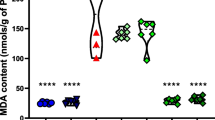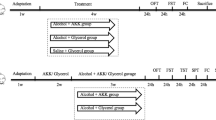Abstract
The physiopathology of anxiety or depression related to diabetes is still poorly understood. The treatment with antidepressant drugs is a huge challenge due to theirs adherence low rate and many adverse effects. Thus, the seeking for a better treatment for these associated diseases is of utmost importance. Given that the oxidative stress in different tissues occurs in diabetes and anxiety or depression as well, the antioxidant gallic acid becomes an interesting compound to be investigated. Thus, the effects of long-term treatment with gallic acid (0, 10, 20 and 40 mg/kg; gavage) were evaluated in diabetic (DBT) animals submitted to the elevated plus-maze (EPM), the light-dark transition (LDT) tests and modified forced swim test (mFST). Also, indirect parameters of oxidative stress, lipid peroxidation (LPO) and reduced glutathione (GSH) levels were evaluated in the hippocampus (HIP) and prefrontal cortex (PFC). The results showed that DBT animals presented a decrease in the spent time in the open arms, in the end arm exploration and head dips when evaluated in the EPM test; moreover, a decrease in the spent time in the lit compartment of LDT test was observed, suggesting an anxiogenic-like behavior. During the mFST, an increase in the mean counts of immobility and a decrease in the mean counts of swimming and climbing were observed, indicating a depressive-like behavior. These aversive behaviors were more pronounced when compared to normoglycemic (NGL) animals and streptozotocin-treated animals that not become DBT. In addition, DBT rats showed an increase in the oxidative stress parameters in the HIP and PFC that was reversed by the gallic acid treatment (lowest dose - 10 mg/kg), i.e., the treatment decreased the elevated LPO levels and increased the reduced GSH in the HIP and PFC. Also, gallic acid treatment was able to produce an anxiolytic-like effect in the EPM and LDT tests, but not antidepressant–like effect in the FST. Taken together, the results suggest that the antioxidant/neuroprotective effect of gallic acid treatment in HIP and PFC of DBT animals may be essential to the anxiolytic-like effect.







Similar content being viewed by others
References
Aksu I, Ates M, Baykara B et al (2012) Anxiety correlates to decreased blood and prefrontal cortex IGF-1 levels in streptozotocin induced diabetes. Neurosci Lett 531:176–181
Anderson RJ, Freedland KE, Clouse RE et al (2001) The prevalence of comorbid depression in adults with diabetes: a meta-analysis. Diabetes Care 24:1069–1078
Anwer T, Sharma M, Pillai KK et al (2012) Protective effect of Withania somnifera against oxidative stress and pancreatic β-cell damage in type 2 diabetic rats. Acta Pol Pharm Drug Res 69:1095–1101
Aswar U, Chepurwar S, Shintre S et al (2017) Telmisartan attenuates diabetes induced depression in rats. Pharmacol Rep 69:358–364
Baburao JA, Anand JV (2012) Vitamin E, its beneficial role in diabetes mellitus (DM) and its complications. J Clin Diagn Res 6:1624–1628
Bambolkar S, Sainani GS (1995) Evaluation of oxidative stress in diabetics with or without vascular complications. J Assoc Physicians India 43:10–12
Bilici M, Efe H, Koroglu MA et al (2001) Antioxidative enzyme activities and lipid peroxidation in major depression: alterations by antidepressant treatments. J Affect Disord 6:43–51
Blois MS (1958) Antioxidant determinations by use of a stable free radical. Nature 181:1199–1200
Borsini F, Podhorna J, Marazziti D (2002) Do animal models of anxiety predict anxiolytic-like effects of antidepressants? Psychopharmacology 163:121–124
Bouayed J, Rammal H, Soulimani R (2009) Oxidative stress and anxiety: relationship and cellular pathways. Oxidative Med Cell Longev 2:63–67
Bourin M (2015) Animal models for screening anxiolytic-like drugs: a perspective. Dialogues Clin Neurosci 17:295–303
Caiaffo V, Oliveira BDR, De Sá FB et al (2016) Anti-inflammatory, antiapoptotic, and antioxidant activity of fluoxetine. Pharma Res Per 4:231
Caletti G, Olguins DB, Pedrollo EF et al (2012) Antidepressant effect of taurine in diabetic rats. Amino Acids 43:1525–1533
Can OD, Oztürk Y, Ozkay UD (2011) Effects of insulin and St. John's wort treatments on anxiety, locomotory activity, depression, and active learning parameters of streptozotocin-diabetic rats. Planta Med 77:1970–1976
Champaneri S, Wand GS, Malhotra SS et al (2010) Biological basis of depression in adults with diabetes. Curr Diab Rep 10:396–405
Chen F, Wu AB, Chen CY (2004) The influence of treatments on the free radical scavenging activity of burdock and variations of its activity. Food Chem 86:479–484
Chhillar R, Dhingra D (2013) Antidepressant-like activity of gallic acid in mice subjected to unpredictable chronic mild stress. Fundam Clin Pharmacol 27:409–418
Clavijo M, Carvalho JJ, Rios M et al (2006) Psychiatric disorders in patients with diabetes type 2 at medical care and training district of Rio Branco-Acre. Brazil. Arq Neuropsiquiatr 64:807–813
Collins MM, Corcoran P, Perry IJ (2009) Anxiety and depression symptoms in patients with diabetes. Diabet Med 26:153–161
Cryan JF, Markou A, Lucki I (2002) Assessing antidepressant activity in rodents: recent developments and future needs. Trends Pharmacol Sci 23:238–245
da Silva Dias IC, Carabelli B, Ishii DK et al (2016) Indoleamine-2,3- Dioxygenase/Kynurenine pathway as a potential pharmacological target to treat depression associated with diabetes. Mol Neurobiol 53:6997–7009
de Morais H, de Souza CP, da Silva LM et al (2014) Increased oxidative stress in prefrontal cortex and hippocampus is related to depressive-like behavior in streptozotocin-diabetic rats. Behav Brain Res 258:52–64
de Morais H, de Souza CP, da Silva LM et al (2016) Anandamide reverses depressive-like behavior, neurochemical abnormalities and oxidative-stress parameters in streptozotocin-diabetic rats: Role of CB1 receptors. Eur Neuropsychopharmacol 26:1590–1600
Dhingra D, Chhillar R, Gupta A (2012) Antianxiety-like activity of gallic acid in unstressed and stressed mice: possible involvement of nitriergic system. Neurochem Res 37(3):487–494
Dipnal JF, Pasco JA, Meyer D et al (2015) The association between dietary patterns, diabetes and depression. J Affect Disord 174:215–224
Egede LE, Ellis C (2010) Diabetes and depression: global perspectives. Diabetes Res Clin Pract 87:302–312
Gambeta E, de Souza CP, de Morais H et al (2016) Reestablishment of the hyperglycemia to the normal levels seems not to be essential to the anxiolytic-like effect induced by insulin. Metab Brain Dis 31:563–571
Gasparovic AC, Lovakovic T, Zarkovic N (2010) Oxidative stress and antioxidants: biological response modifiers of oxidative homeostasis in cancer. Period Biol 112:433–439
Golden SH, Lazo M, Carnethon M et al (2008) Examining a bidirectional association between depressive symptoms and diabetes. JAMA 299:2751–2759
Gomez R, Barros HM (2000) Ethopharmacology of the antidepressant effect of clonazepam in diabetic rats. Pharmacol Biochem Behav 66:329–335
Grigsby AB, Anderson RJ, Freedland KE et al (2002) Prevalence of anxiety in adults with diabetes: a systematic review. J Psychosom Rev 53:1053–1060
Gupta D, Kurhe Y, Radhakrishnan M (2014) Antidepressant effects of insulin in streptozotocin induced diabetic mice: Modulation of brain serotonin system. Physiol Behav 129:73–78
Herken H, Gurel A, Selek S et al (2007) Adenosine deaminase, nitric oxide, superoxide dismutase, and xanthine oxidase in patients with major depression: impact of antidepressant treatment. Arch Med Res 38:247–252
Huether G, Schuff-Werner P (1996) Platelet serotonin acts as a locally releasable antioxidant. Adv Exp Med Biol 398:299–306
IDF-International Diabetes Federation (2015) About diabetes <http://www.idf.org/about-diabetes>
Inoue M, Suzuki R, Sakaguchi N et al (1995) Selective induction of cell death in cancer cells by gallic acid. Biol Pharm Bull 18:1526–1530
Jiang ZY, Woollard AC, Wolff SP (1991) Lipid hydroperoxide measurement by oxidation of Fe2+ in the presence of xylenol orange. Comparison with the TBA assay and an iodometric method. Lipids 26:853–856
Kade IJ, Rocha JB (2013) Gallic acid modulates cerebral oxidative stress conditions and activities of enzyme-dependent signaling systems in streptozotocin-treated rats. Neurochem Res 38:761–771
Kamei J, Miyata S, Morita K et al (2003) Effects of selective serotonin reuptake inhibitors on immobility time in the tail suspension test in streptozotocin-induced diabetic mice. Pharmacol Biochem Behav 75:247–254
Kanazawa LKS, Vecchia DD, Wendler EM et al (2016) Quercetin reduces manic-like behavior and brain oxidative stress induced by paradoxical sleep deprivation in mice. Free Radic Biol Med 99:79–86
Khanzode SD, Dakhale GN, Khanzode SS et al (2003) Oxidative damage and major depression: the potential antioxidant action of selective serotonin re-uptake inhibitors. Redox Rep 8:365–370
Kim DO, Lee KW, Lee HJ et al (2002) Vitamin C equivalent antioxidant capacity (VCEAC) of phenolic phytochemicals. J Agric Food Chem 50:3713–3717
Kroes BH, van den Berg AJ, Quarles van Ufford HC et al (1992) Anti-inflammatory activity of gallic acid. Planta Med 58:499–504
Kurhe Y, Mahesh R (2015) Ondansetron attenuates co-morbid depression and anxiety associated with obesity by inhibiting the biochemical alterations and improving serotonergic neurotransmission. Pharmacol Biochem Behav 136:107–116
Latha RC, Daisy P (2011) Insulin-secretagogue, antihyperlipidemic and other protective effects of gallic acid isolated from terminalia bellerica Roxb.in streptozotocin-induced diabetic rats. Chem Biol Interact 189:112–118
Lee W, Lee SY, Son YJ et al (2015) Gallic acid decreases inflammatory cytokine secretion through histone acetyltransferase/histone deacetylase regulation in high glucose-induced human monocytes. J Med Food 18:793–801
Lin EH, Von Korff M, Alonso J et al (2008) Mental disorders among persons with diabetes--results from the World Mental Health Surveys. J Psychosom Res 65:571–580
Mansouri MT, Soltani M, Naghizadeh B et al (2014) A possible mechanism for the anxiolytic-like effect of gallic acid in the rat elevated plus maze. Pharmacol Biochem Behav 117:40–46
Mishra K, Ojha H, Chaudhury NK (2012) Estimation of antiradical properties of using DPPH assay: a critical review and results. Food Chem 130:1036–1043
Moretti M, Colla A, de Oliveira Balen G et al (2012) Ascorbic acid treatment, similarly to fluoxetine, reverses depressive-like behavior and brain oxidative damage induced by chronic unpredictable stress. J Psychiatr Res 46:331–340
Patel SS, Goyal RK (2011) Prevention of diabetes-induced myocardial dysfunction in rats using the juice of the Emblica officinalis fruit. Exp Clin Cardiol 16:87–91
Pellow S, Chopin P, File SE et al (1985) Validation of open: closed arm entries in the elevated plus-maze as a measure of anxiety in the rat. J Neurosci Methods 14:149–167
Porsolt RD, Bertin A, Blavet N et al (1979) Immobility induced by forced swimming in rats: effects of agents wich modify central catecholamine and serotonin activity. Eur J Pharmacol 57:201–210
Punithavathi VR, Prince PS, Kumar R (2011) Antihyperglycaemic, antilipid peroxidative and antioxidant effects of gallic acid on streptozotocin induced diabetic wistar rats. Eur J Pharmacol 650:465–471
Rebai R, Jasmin L, Boudah A (2017) The antidepressant effect of melatonin and fluoxetine in diabetic rats is associated with a reduction of the oxidative stress in the prefrontal and hippocampal cortices. Brain Res Bull 134:142–150
Redivo DD, Schreiber AK, Adami ER et al (2016) Effect of omega-3 polyunsaturated fatty acid treatment over mechanical allodynia and depressive-like behavior associated with experimental diabetes. Behav Brain Res 298:57–64
Renn BN, Feliciano L, Segal DL (2011) The bidirectional relationship of depression and diabetes: a systematic review. Clin Psychol Rev 31:1239–1246
Roy T, Lloyd CE (2012) Epidemiology of depression and diabetes: a systematic review. J Affect Disord 142:S8–S21
Sedlak J, Lindsay RH (1968) Estimation of total, protein-bound, and nonprotein sulfhydryl groups in tissue with Ellman's reagent. Anal Biochem 25:192–205
Sharma P, Bhardwaj P, Singh R (2016) Administration of lactobacillus casei and bifidobacterium bifidum ameliorated hyperglycemia, dyslipidemia, and oxidative stress in diabetic rats. Int J Prev Med 22:102
Siba IP, Bortolanza M, Frazão Vital MAB et al (2017) Fish oil prevents rodent anxious states comorbid with diabetes: a putative involvement of nitric oxide modulation. Behav Brain Res 326:173–186
Singh P, Rahul MK, Vijay T et al (2013) Anxiolytic effect of chronic administration of gallic acid in rats. J appl pharm sci 3:101–104
Stanely MPP, Kumar MR, Selvakumari CJ (2011) Effects of gallic acid on brain lipid peroxide and lipid metabolism in streptozotocin-induced diabetic wistar rats. J Biochem Mol Toxicol 25:101–107
Todorović N, Filipović D (2017) The antidepressant- and anxiolytic-like effects of fluoxetine and clozapine in chronically isolated rats involve inhibition of hippocampal TNF-α. Pharmacol Biochem Behav 17:30419–30417
Vicente MA, Zangrossi HJR (2014) Involvement of 5-HT2C and 5-HT1A receptors of the basolateral nucleus of the amygdala in the anxiolytic effect of chronic antidepressant treatment. Neuropharmacology 79:127–135
Wayhs CA, Manfredini V, Sitta A et al (2010) Protein and lipid oxidative damage in streptozotocin-induced diabetic rats submitted to forced swimming test: the insulin and clonazepam effect. Metab Brain Dis 25:297–304
Wayhs CA, Mescka CP, Guerreiro G et al (2014) Diabetic encephalopathy-related depression: experimental evidence that insulin and clonazepam restore antioxidant status in rat brain. Cell Biochem Funct 32:711–719
Wrighten SA, Piroli GG, Grillo CA et al (2009) A look inside the diabetic brain: contributors to diabetes-induced brain aging. Biochim Biophys Acta 1792:444–453
Yu Z, Song F, Jin YC et al (2018) Comparative pharmacokinetics of gallic acid after oral administration of gallic acid monohydrate in normal and isoproterenol-induced myocardial infarcted rats. Front Pharmacol 9:328
Zanoveli JM, de Morais H, Dias IC et al (2016) Depression associated with diabetes: from pathophysiology to treatment. Curr Diabetes Rev 12:165–178
Acknowledgements
HM, CRC and ERA are recipients of a fellowship from Coordenação de Aperfeiçoamento de Pessoal de Nível Superior (CAPES).
Author information
Authors and Affiliations
Contributions
Janaína M Zanoveli proposed the study. Mariana M Pereira and Helen de Morais conducted the behavioral tests. Claudia R Corso, Eliana R Adami and Alexandra Acco were responsible for evaluating oxidative stress. Eldevan S Silva and Rosa M Carlos were responsible for the donation of gallic acid. All of the authors contributed to the data analysis and interpretation, wrote the manuscript and approved the final article.
Corresponding author
Ethics declarations
Conflicts of interest
All of the authors declare that they have no conflicts of interest.
Rights and permissions
About this article
Cite this article
Pereira, M.M., de Morais, H., dos Santos Silva, E. et al. The antioxidant gallic acid induces anxiolytic-, but not antidepressant-like effect, in streptozotocin-induced diabetes. Metab Brain Dis 33, 1573–1584 (2018). https://doi.org/10.1007/s11011-018-0264-9
Received:
Accepted:
Published:
Issue Date:
DOI: https://doi.org/10.1007/s11011-018-0264-9




